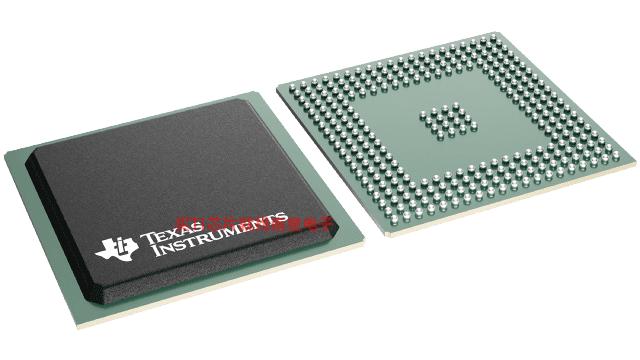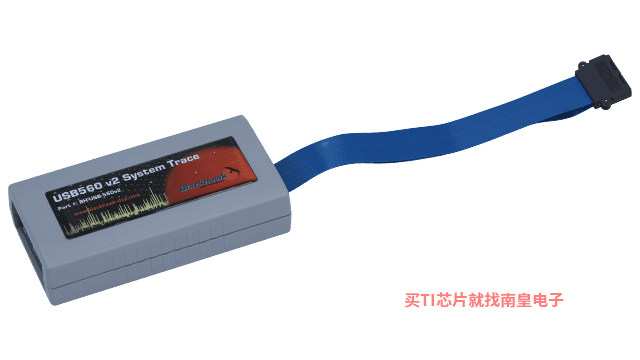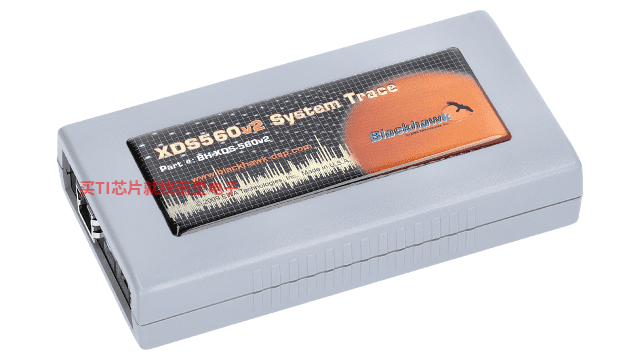
- 制造厂商:TI
- 产品类别:微控制器 (MCU) 和处理器
- 技术类目:处理器 - 数字信号处理器 (DSP)
- 功能描述:增强型产品 C6712D DSP
- 点击这里打开及下载SM320C6712D-EP的技术文档资料
- TI代理渠道,提供当日发货、严格的质量标准,满足您的目标价格

The 320C67x™ DSPs (including the SM320C6712-EP, SM320C6712C-EP, SM320C6712D-EP devices ) are members of the floating-point DSP family in the TMS320C6000™ DSP platform. The C6712, C6712C, and C6712D devices are based on the high-performance, advanced very-long-instruction-word (VLIW) architecture developed by Texas Instruments (TI), making these DSPs an excellent choice for multichannel and multifunction applications.
) are members of the floating-point DSP family in the TMS320C6000™ DSP platform. The C6712, C6712C, and C6712D devices are based on the high-performance, advanced very-long-instruction-word (VLIW) architecture developed by Texas Instruments (TI), making these DSPs an excellent choice for multichannel and multifunction applications.
With performance of up to 1000 million floating-point operations per second (MFLOPS) at a clock rate of 167 MHz, the C6712C/C6712D device is the lowest-cost DSP in the C6000™ DSP platform. The C6712C/C6712D DSP possesses the operational flexibility of high-speed controllers and the numerical capability of array processors. This processor has 32 general-purpose registers of 32-bit word length and eight highly independent functional units. The eight functional units provide four floating-/fixed-point ALUs, two fixed-point ALUs, and two floating-/fixed-point multipliers. The C6712C/C6712D can produce two MACs per cycle for a total of 300 MMACS.
With performance of up to 600 million floating-point operations per second (MFLOPS) at a clock rate of 100 MHz, the C6712 device also offers cost-effective solutions to high-performance DSP programming challenges. The C6712 DSP possesses the operational flexibility of high-speed controllers and the numerical capability of array processors. This processor has 32 general-purpose registers of 32-bit word length and eight highly independent functional units. The eight functional units provide four floating-/fixed-point ALUs, two fixed-point ALUs, and two floating-/fixed-point multipliers. The C6712 can produce two multiply-accumulates (MACs) per cycle for a total of 200 million MACs per second (MMACS).
The C6712/C6712C/C6712D uses a two-level cache-based architecture and has a powerful and diverse set of peripherals. The Level 1 program cache (L1P) is a 32-Kbit direct mapped cache and the Level 1 data cache (L1D) is a 32-Kbit 2-way set-associative cache. The Level 2 memory/cache (L2) consists of a 512-Kbit memory space that is shared between program and data space. L2 memory can be configured as mapped memory, cache, or combinations of the two. The peripheral set includes two multichannel buffered serial ports (McBSPs), two general-purpose timers, and a glueless 16-bit external memory interface (EMIF) capable of interfacing to SDRAM, SBSRAM, and asynchronous peripherals. The C6712C device also includes a dedicated general-purpose input/output (GPIO) peripheral module.
The C6712/C6712C/C6712D DSPs also have application-specific hardware logic, on-chip memory, and additional on-chip peripherals.
The C6712/C6712C/C6712D has a complete set of development tools which includes: a new C compiler, an assembly optimizer to simplify programming and scheduling, and a Windows™ debugger interface for visibility into source code execution.
- Controlled Baseline
- One Assembly/Test Site, One Fabrication Site
- Enhanced Diminishing Manufacturing Sources (DMS) Support
- Enhanced Product-Change Notification
- Qualification Pedigree
- Low-Price/High-Performance Floating-Point Digital Signal Processors (DSPs): 320C67x? (SM320C6712, C6712C, C6712D)
- Eight 32-Bit Instructions/Cycle
- 100-, 167-MHz Clock Rates
- 10-, 6-ns Instruction Cycle Times
- 600, 1000 MFLOPS
- Advanced Very Long Instruction Word (VLIW) C67x? DSP Core
- Eight Highly Independent Functional Units:
- Four ALUs (Floating- and Fixed-Point)
- Two ALUs (Fixed-Point)
- Two Multipliers (Floating- and Fixed-Point)
- Load-Store Architecture With 32 32-Bit General-Purpose Registers
- Instruction Packing Reduces Code Size
- All Instructions Conditional
- Eight Highly Independent Functional Units:
- Instruction Set Features
- Hardware Support for IEEE Single-Precision and Double-Precision Instructions
- Byte-Addressable (8-, 16-, 32-Bit Data)
- 8-Bit Overflow Protection
- Saturation
- Bit-Field Extract, Set, Clear
- Bit-Counting
- Normalization
- Device Configuration
- Boot Mode: 8- and 16-Bit ROM Boot
- Endianness: Little Endian (12/12C) Little Endian, Big Endian (12D)
- L1/L2 Memory Architecture
- 32K-Bit (4K-Byte) L1P Program Cache (Direct Mapped)
- 32K-Bit (4K-Byte) L1D Data Cache (2-Way Set-Associative)
- 512K-Bit (64K-Byte) L2 Unified Mapped RAM/Cache (Flexible Data/Program Allocation)
- Enhanced Direct-Memory-Access (EDMA) Controller (16 Independent Channels)
- 16-Bit External Memory Interface (EMIF)
- Glueless Interface to Asynchronous Memories: SRAM and EPROM
- Glueless Interface to Synchronous Memories: SDRAM and SBSRAM
- 256M-Byte Total Addressable External Memory Space
- Two Multichannel Buffered Serial Ports (McBSPs)
- Direct Interface to T1/E1, MVIP, SCSA Framers
- ST-Bus-Switching Compatible
- Up to 256 Channels Each
- AC97-Compatible
- Serial-Peripheral-Interface (SPI) Compatible (Motorola?)
- Two 32-Bit General-Purpose Timers
- Flexible Phase-Locked-Loop (PLL) Clock Generator [C6712]
- Flexible Software Configurable PLL-Based Clock Generator Module [C6712C/C6712D]
- A Dedicated General-Purpose Input/Output (GPIO) Module With 5 Pins [12C/12D]
- IEEE-1149.1 (JTAG) Boundary-Scan-Compatible
- CMOS Technology
- 0.13-μm/6-Level Copper Metal Process (C6712C/C6712D)
- 0.18-μm/5-Level Metal Process (C6712)
320C67x and C67x are trademarks of Texas Instruments. Motorola is a trademark of Motorola, Inc. All trademarks are the property of their respective owners. Component qualification in accordance with JEDEC and industry standards to ensure reliable operation over an extended temperature range. This includes, but is not limited to, Highly Accelerated Stress Test (HAST) or biased 85/85, temperature cycle, autoclave or unbiased HAST, electromigration, bond intermetallic life, and mold compound life. Such qualification testing should not be viewed as justifying use of this component beyond specified performance and environmental limits. IEEE Standard 1149.1-1990 Standard-Test-Access Port and Boundary Scan Architecture. TMS320C6000 is a trademark of Texas Instruments. Windows is a registered trademark of the Microsoft Corporation. Throughout the remainder of this document, the SM320C6712-EP, SM320C6712C-EP, and SM320C6712D-EP shall be referred to as 320C67x or C67x where generic, and where specific, their individual full device part numbers will be used or abbreviated as C6712, C6712C, C6712D, 12, 12C, or 12D, etc.
- DSP
- 1 C67x
- DSP MHz (Max)
- 167
- CPU
- 32-/64-bit
- Operating system
- DSP/BIOS
- Rating
- HiRel Enhanced Product
- Operating temperature range (C)
- -40 to 105
SM320C6712D-EP的完整型号有:SM32C6712DGDPA16EP、V62/04754-03YA,以下是这些产品的关键参数及官网采购报价:
SM32C6712DGDPA16EP,工作温度:-40 to 105,封装:BGA (GDP)-272,包装数量MPQ:40个,MSL 等级/回流焊峰值温度:Level-3-220C-168 HR,引脚镀层/焊球材料:SNPB,TI官网SM32C6712DGDPA16EP的批量USD价格:18.348(1000+)
V62/04754-03YA,工作温度:-40 to 105,封装:BGA (GDP)-272,包装数量MPQ:40个,MSL 等级/回流焊峰值温度:Level-3-220C-168 HR,引脚镀层/焊球材料:SNPB,TI官网V62/04754-03YA的批量USD价格:18.348(1000+)

TMDSEMU560V2STM-U — Blackhawk XDS560v2 系统跟踪 USB 仿真器
XDS560v2 System Trace 是 XDS560v2 系列高性能 TI 处理器调试探针(仿真器)的第一种型号。XDS560v2 是 XDS 系列调试探针中性能最高的一款,同时支持传统 JTAG 标准 (IEEE1149.1) 和 cJTAG (IEEE1149.7)。
XDS560v2 System Trace 在其巨大的外部存储器缓冲区中加入了系统引脚跟踪。这种外部存储器缓冲区适用于指定的 TI 器件,通过捕获相关器件级信息,获得准确的总线性能活动和吞吐量,并对内核和外设进行电源管理。此外,对于带有嵌入式缓冲跟踪器 (ETB) 的所有 ARM 和 DSP 处理器,所有 XDS (...)
TMDSEMU560V2STM-UE — Spectrum Digital XDS560v2 系统跟踪 USB 和以太网
XDS560v2 System Trace 是 XDS560v2 系列高性能 TI 处理器调试探针(仿真器)的第一种型号。XDS560v2 是 XDS 系列调试探针中性能最高的一款,同时支持传统 JTAG 标准 (IEEE1149.1) 和 cJTAG (IEEE1149.7)。
XDS560v2 System Trace 在其巨大的外部存储器缓冲区中加入了系统引脚跟踪。这种外部存储器缓冲区适用于指定的 TI 器件,通过捕获相关器件级信息,获得准确的总线性能活动和吞吐量,并对内核和外设进行电源管理。此外,对于带有嵌入式缓冲跟踪器 (ETB) 的所有 ARM 和 DSP 处理器,所有 XDS (...)
FAXLIB — 用于 C66x、C64x+ 和 C55x 处理器的传真库 (FAXLIB)
TMS320C6000 Digital Signal Processor Library (DSPLIB) is a platform-optimized DSP function library for C programmers. It includes C-callable, general-purpose signal-processing routines that are typically used in computationally intensive real-time applications. With these routines, higher (...)PROCESSORS-3P-SEARCH — Arm-based MPU, arm-based MCU and DSP third-party search tool
TI has partnered with companies to offer a wide range of software, tools, and SOMs using TI processors to accelerate your path to production. Download this search tool to quickly browse our third-party solutions and find the right third-party to meet your needs. The software, tools and modules (...)



